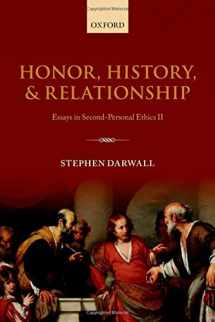
Honor, History, and Relationship: Essays in Second-Personal Ethics II
ISBN-13:
9780199662609
ISBN-10:
0199662606
Edition:
1
Author:
Stephen Darwall
Publication date:
2013
Publisher:
Oxford University Press
Format:
Hardcover
298 pages
Category:
Jurisprudence
,
Legal Theory & Systems
,
Ethics & Morality
,
Philosophy
,
History & Surveys
FREE US shipping
Book details
ISBN-13:
9780199662609
ISBN-10:
0199662606
Edition:
1
Author:
Stephen Darwall
Publication date:
2013
Publisher:
Oxford University Press
Format:
Hardcover
298 pages
Category:
Jurisprudence
,
Legal Theory & Systems
,
Ethics & Morality
,
Philosophy
,
History & Surveys
Summary
Honor, History, and Relationship: Essays in Second-Personal Ethics II (ISBN-13: 9780199662609 and ISBN-10: 0199662606), written by authors
Stephen Darwall, was published by Oxford University Press in 2013.
With an overall rating of 3.8 stars, it's a notable title among other
Jurisprudence
(Legal Theory & Systems, Ethics & Morality, Philosophy, History & Surveys) books. You can easily purchase or rent Honor, History, and Relationship: Essays in Second-Personal Ethics II (Hardcover) from BooksRun,
along with many other new and used
Jurisprudence
books
and textbooks.
And, if you're looking to sell your copy, our current buyback offer is $0.3.
Description
In Honor, History, and Relationship Stephen Darwall explores the idea of a second-personal framework for morality and its foundations, in which we are committed to morality by presuppositions that are inescapable when we relate to others (person to person). He expands on the argument set forth in The Second-Person Standpoint to explore the second-personal framework in three further settings. The first concerns a fundamental difference between the form that respect and the concept of person take in honor cultures, on the one hand, and the shape these assume in morality conceived as equal accountability, on the other. One essay explores this difference directly while others investigate related themes of justice versus retaliation and vengeance for insult and injury to honor, including in the writings of Adam Smith and Nietzsche on ressentiment. A second setting concerns the role of second-personal ideas in the development of a distinctively "modern" moral philosophy, beginning in seventeenth-century Europe. Two essays here discuss the centrality of second-personal notions in two formative modern natural law theorists: Grotius and Pufendorf. And two others concentrate on the role of reciprocal recognition in Kant and Fichte, respectively. A third group of essays treat the second-personal structure of interpersonal relations. There are three essays in this group: one on promising as a second-personal transaction between promiser and promisee, a second on what it is to be with another person, and a third on the role of second-personal standing in personal relationships.


We would LOVE it if you could help us and other readers by reviewing the book
Book review

Congratulations! We have received your book review.
{user}
{createdAt}
by {truncated_author}


